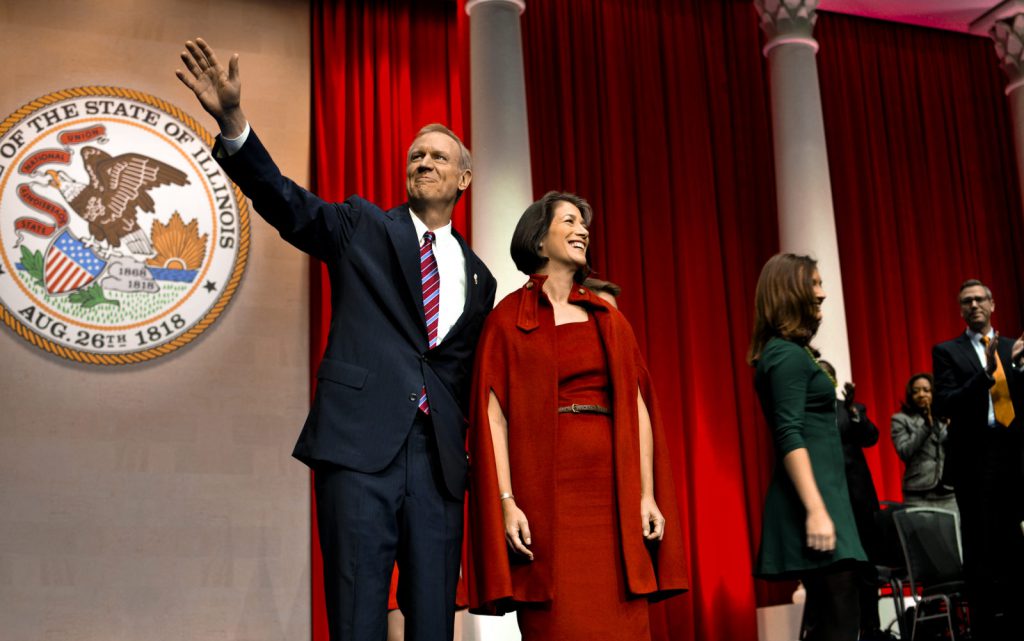
Published October 4, 2017
If you’re from Illinois, you’re accustomed to, and therefore not surprised by, politicians making questionable judgment calls. There were the attempts by the convicted and now imprisoned former governor Rod Blagojevich to sell the U.S. Senate seat vacated by Barack Obama. More recently, Senator Richard Durbin stunned observers with his religiously bigoted questioning of federal appellate-court nominee Amy Barrett, grilling the respected Notre Dame law professor and mother of seven on the exact nature and extent of her Catholic faith. “Are you an orthodox Catholic?” he asked, stricken, it seemed, at the very thought that a Catholic who genuinely embodies her faith would sit on the federal bench.
But last week, Republican governor Bruce Rauner took an action so shocking in its duplicity and so out of step with the views of Illinois voters that many political watchers say it has likely ended his career in electoral politics. Last week Rauner signed HB 40, a bill sponsored by Democrats in the Illinois legislature. In doing so, he created a sad bit of history: Rauner became the first U.S. governor to initiate publicly funded abortions for all state employees and for all Medicaid recipients.
What’s more, he approved the measure after explicitly assuring the GOP caucus, religious leaders, and a host of pro-family and pro-life organizations that he would veto it. A veto would have been popular with Democrats and Republicans alike. Polls on the question of publicly funded abortion have consistently shown that taxpayers — even those who support legal abortion — disagree with using public dollars to pay for it. A QEV Analytics poll taken in March 2017 asked Illinois registered voters: “Regardless of your personal opinion of abortion, do you favor or oppose allowing state government funding of abortion? Do you hold that opinion strongly or not strongly?” Fifty-eight percent of voters said they opposed public funding, and 50 percent opposed it “strongly,” while only 32 percent favored it and only 28 percent “strongly.” The poll’s respondents included more people who had voted for Hillary Clinton than for Donald Trump, and more Democrats than Republicans.
Consequently, the governor’s political future seems tenuous at best. State representative Jeanne Ives questioned what Rauner’s decision would mean for his political future. “Taxpayer funding of abortion is hugely unpopular with Illinois voters,” she tells me. “And he promised the GOP caucus he would veto this bill. He’s now made it ten times more difficult to get himself reelected — and equally difficult to get fellow Republicans to campaign with him or for him.”
Veteran political commentators agreed. “Governor Rauner said from the time he was a candidate that he was a fiscal conservative with no social agenda. His wife, Diana, a major Planned Parenthood donor, said they were both ‘social-justice warriors.’ One of them turned out to be a liar — and it wasn’t Diana,” says Dan Proft, a conservative Chicago-area talk-show host and former Republican gubernatorial candidate. “Rauner’s fiscal conservatism never materialized, but the radical-left social agenda did, which is why his poll numbers read like a Chicago thermometer in February.”
The law’s impact will likely be dramatic. From data for the previous period during which Illinois permitted Medicaid-funded abortions, it is estimated that 12,000 abortions a year will now be funded with taxpayer dollars. And the law limits neither the number of abortions a woman can have nor when in her pregnancy she can have them. These are not insignificant considerations given that a number of Illinois abortion clinics openly advertise that they perform abortions later in pregnancy. Also, half of all abortions done nationwide are now repeat procedures, according to Planned Parenthood’s own statistic.
For the past two decades, Illinois has ranked among the nation’s bottom ten states for Medicaid services to the developmentally or physically disabled. And the additional cost to taxpayers for free abortions for state-employee and Medicaid recipients? An estimated $1.8 to $21 million — each year. Governor Rauner’s new prioritization of public funds is rather telling, and it did not go unnoticed by families who have disabled members reliant on state support. A friend of mine who has a daughter with severe disabilities was sharing with me that she can’t find a specialist to see her daughter — because she’s on Medicaid. She was completely disheartened by Rauner’s decision: “Wouldn’t it be nice if he signed a bill to pay doctors to do good?” she asked. Meanwhile, loss of state funding has forced an activity center for disabled adults in Chicago to close.
Why did Governor Rauner sign such a wildly unpopular bill when he promised he wouldn’t? Speculation abounds. One theory is that he’s not planning to run for reelection and that the bill was a parting favor to the abortion-advocacy groups that he and his wife support. There are those who disagree, saying he fully plans to run again but underestimated, dramatically, the reaction of the political base he betrayed, figuring they would chalk it up to “politics as usual” and forgive and forget, eventually. Others surmise that, faced with an equally abortion-supporting Democratic opponent next November, Rauner calculated that rank-and-file Republicans would have no place to go but with the party nominee and would vote for him regardless of what he had done.
Whatever the reason for his decision, one thing is clear: If he chooses to run again, Bruce Rauner will have a rough road ahead of him. And he will have only himself to blame.
— Mary Hallan FioRito is an attorney and the Cardinal Francis George Fellow at the Ethics and Public Policy Center.








